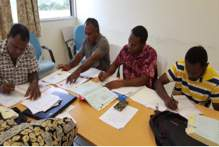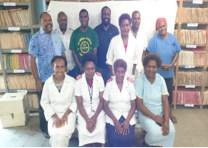Laboratory-based surveillance is important for national and global health security, but in many PICTs, the bulk of laboratory resources are earmarked for clinical laboratory services, not surveillance. Quality management, systems and processes are also inadequate to support effective laboratory surveillance.
Responding to Vanuatu’s request for assistance after TC Pam, SPC helped to strengthen the capability of its health laboratories with a focus on public health laboratory-based surveillance and laboratory quality management systems (LQMS).
Given the lack of investment in public health laboratory surveillance in Vanuatu and many other PICTs, the first task for SPC was to advocate the need for national champions, or focal points, for laboratory-based surveillance. SPC then supported the participation of national focal points in Data for Decision Making training to ensure they understood the important role of clinical laboratories in public health surveillance.
SPC also developed appropriate algorithms for disease-specific tests in alignment with national syndromic surveillance reporting. With KfW funding for extended recovery activities in Vanuatu, SPC was able to broaden its support to provincial laboratories, where staff were given training to strengthen networks and surveillance capacity. To put their training into practice, these staff participated in investigating a real outbreak, with hands-on mentoring by SPC staff.
An important component of laboratory surveillance is shipment of laboratory specimens to offshore reference laboratories for confirmatory testing. In 2017, SPC conducted IATA-certified training on shipping infectious substances for 10 Vanuatu laboratory workers.
SPC worked with the Vanuatu Ministry of Health to conduct audits of quality management systems in provincial laboratories. To help Vanuatu improve its standing against accepted benchmarks for laboratory quality management systems in the Pacific, SPC followed up the assessments with training for 15 ni-Vanuatu laboratory staff on the key principles of quality management.


As a result of SPC’s advocacy, Vanuatu’s Ministry of Health now has two laboratory officers who are national champions for strengthening lab-based surveillance activities. The dedicated focal points will help ensure sustainability in this area.
Another achievement is the improved surveillance network in Vanuatu, with enhanced links, communication and information sharing between the national medical laboratory and provincial hospital laboratories. At the regional level, SPC’s support has improved relationships and networking between the Vanuatu national health laboratory and surveillance reference laboratories in the Pacific.
‘With the continuous strong support and the proactive involvement of SPC in Vanuatu, there is great improvement in the Vanuatu national surveillance network and links to the provincial hospital labs throughout Vanuatu. This has strengthened the laboratory diagnostic service in providing quality needs…Vanuatu lab surveillance has built a good relationship with other surveillance reference laboratories in the Pacific region with the great assistance of SPC.’ – George Pakoa, Laboratory Director, Vanuatu.
With 10 new IATA-certified shippers, the Ministry of Health has improved its capacity to ship specimens to reference laboratories abroad in compliance with standards. Meanwhile, as a result of audits of quality management systems in several provincial laboratories, staff and health managers now know how their laboratories rate against the desired benchmarks. Follow-up training in laboratory quality management has enhanced the capacity of 15 ni- Vanuatu laboratory workers, including in meeting requirements for accurate and timely reporting.
Lessons learned
- Securing support at the highest level (e.g. involving laboratory directors), assigning local champions and working with frontline staff are all critical for local buy-in and the sustainability of improvements.
- Health staff are often shift SPC’s approach of delivering all training modules twice during a country visit caters for workers’ availability at different times.
